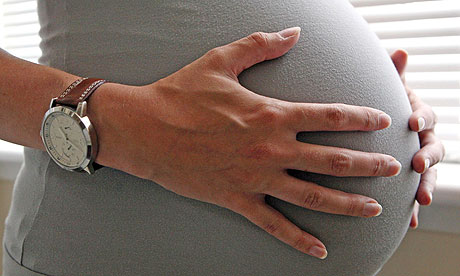
More than one in 20 women giving birth – over 38,000 a year – are severely obese and their babies are twice as likely to be stillborn as a result, an authoritative report has found.
The Centre for Maternal and Child Enquiries today publishes the first official figures on obesity in pregnancy following a three-year national study It also details the problems faced by the NHS, which is ill-prepared to cope.
CMACE – an independent charity which until earlier this year was part of the Royal College of Obstetricians and Gynaecologists – focused on women who are deemed severely obese, with a BMI (body mass index, a ratio of weight to height) of more than 35. Someone with a BMI of more than 30 is generally considered obese.
CMACE found that 38,478, or more than 5%, of the pregnant women in the population were severely obese, with a BMI over 35. A woman of average height (1.65m or 5 feet 5in) with a BMI of 35 would weigh 95.25kg (15 stone). Some 15,400 women, or 2%, had a BMI over 40 – corresponding to at least 109kg (17.2 stone) at average height – and 1,500, or 0.2%, had a BMI over 50, or more than 137kg (21.6 stone).
"We are not talking about small numbers here," said Dr Kate Fitzsimons, research lead for the project.
Stillbirths among the babies of severely obese women are twice as high as the overall average rate, at 8.6 per 1,000 births compared with 3.9 per 1,000. The risk rises with the level of obesity of the mother.
However, Dr Imogen Stephens, the clinical director of CMACE, said the severely obese women described in the report tended to be "older, with more children, living in poor areas where services and the quality of life is poor and household income is likely to be low".
About 38% of obese women are diagnosed with health problems before or during their pregnancy. They have a high risk of miscarriage, a high rate of chronic disease, potentially dangerously high blood pressure, blood clots which can be fatal and a risk of haemorrhage.
The obesity rate is worst in Wales, where one in every 15 pregnant women is severely obese. In England, the highest rate is in East Anglia, with one in 16 severely obese in pregnancy, and lowest in London, where it is one in 29.
The NHS is underequipped to cope, the report says. Many maternity units did not have extra-wide wheelchairs, trolleys and beds. The report found that 18% of obstetric units did not have access to an operating table that was large and robust enough for a woman of extreme weight.
CMACE found that only half of severely obese pregnant women are treated with drugs that can stop a potentially fatal blood clot developing.
Obese women are also not getting to see an obstetric anaesthetist before labour begins so that a plan can be made. "Maternity units are underprepared. It is difficult to exaggerate how big a problem this is for most of us working in the NHS," said Tim Draycott, a consultant obstetrician.
"I work in Bristol. Our rate feels more like the Welsh rate than the London rate. There are significant complications for mothers and babies and much of that is preventable given the right care."
The National Childbirth Trust said there was an immediate need to improve the information given to obese women. "We are concerned that the results show so many obese women are not receiving optimal clinical care," said Mary Newburn, the NCT's head of research.
Neal Long, chief executive of the stillbirth charity, Sands, said women needed to be encouraged to reach a healthy weight before pregnancy.
"Seventeen babies are stillborn or die shortly after birth every day in the UK," he said. "This is already an unacceptable level. There is a very real danger that growing levels of obesity in the general population will lead to yet more stillbirths."

